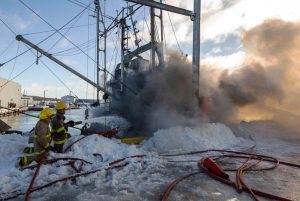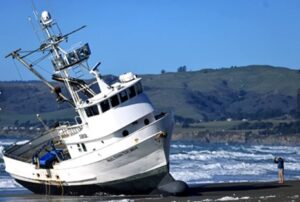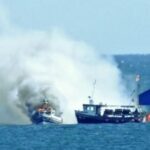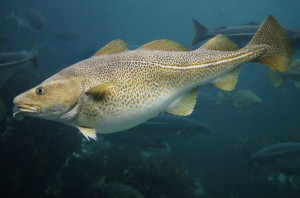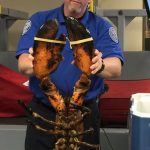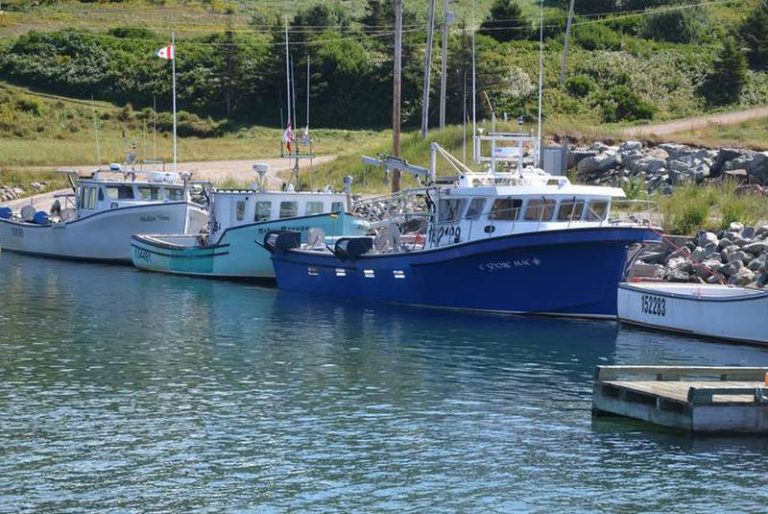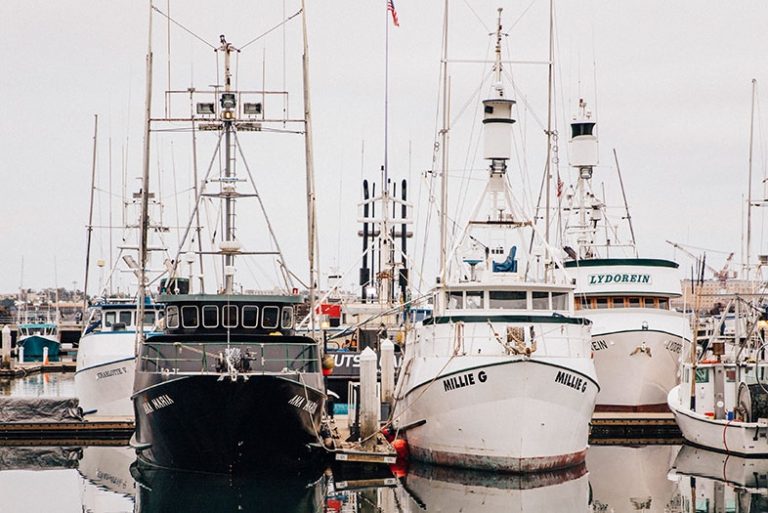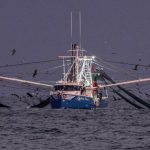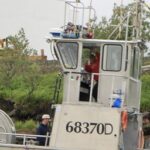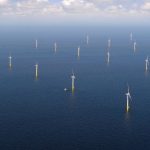Tag Archives: Gulf of St. Lawrence
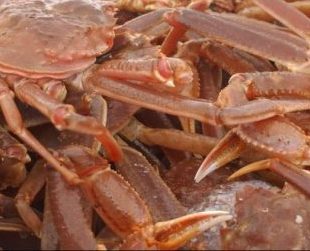
‘Everybody’s losing’: Crab fishermen prepare for more closures this week
With nine more fishing areas to close this week as endangered whales arrive in the Gulf of St. Lawrence, New Brunswick snow crab fishermen are braced for a turbulent season. “We don’t know what’s going to happen today, tomorrow and for the coming days,” said Jean Lanteigne, general manager of the Regional Federation of Professional Fishermen, based in Shippagan. On Wednesday at 4 p.m., nine more “grids” or portions of grids will close to protect North Atlantic right whales from getting tangled up in fishing gear. That number is in addition to the six that closed last week. “It’s impossible to fish in there,” said Lanteigne. >click to read<18:01
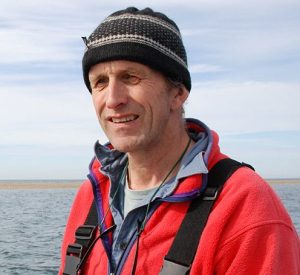
How ropeless fishing traps could protect North Atlantic right whales — and the fishing industry
Tensions between Atlantic fishermen and conservationists escalated this week as the Department of Oceans and Fisheries closed six fishing grounds off the coasts of New Brunswick and Quebec.,, The whales’ arrival left many Canadian fishermen scrambling to remove their equipment from the affected waters amidst concern over what the closures could mean for their quotas. But scientist and veterinarian Michael Moore is advocating for a new technology that could appease both groups: ropeless fishing traps. >click to read<Who is Michael Moore, >click to read<09:52
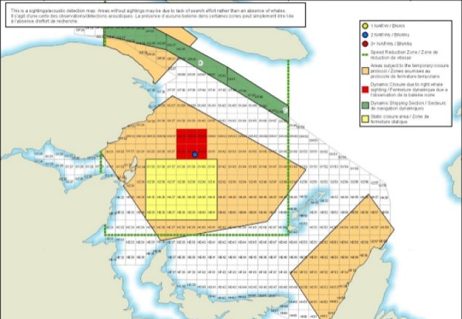
Gulf of St. Lawrence – 6 fishing areas closing after 2 right whales spotted
The Department of Fisheries and Oceans is temporarily closing several fishing areas in an effort to protect endangered right whales. In a tweet, Fisheries Minister Dominic LeBlanc said two North Atlantic right whales were spotted in the Gulf of St. Lawrence off the coast of New Brunswick. The closures will take effect May 22 at 4 p.m. and all gear is expected to be removed from the water by that time. The closures are for the following fisheries: snow crab, toad crab, rock crab, lobster and whelk. The closures will also apply to winter flounder and Atlantic halibut, except where gear is not left unattended. >click to read<07:25
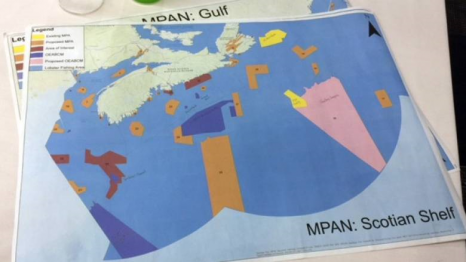
Ottawa considers dozens more marine protected areas in Maritimes that have not been made public
Ottawa is considering dozens more marine protected areas in Maritime waters, according to maps and other data shared by the federal government with stakeholders. The maps show 24 proposed marine protected areas (MPA) on the Scotian Shelf, including the entire Bras d’Or Lakes in Cape Breton and dozens more in the Gulf of St. Lawrence. The maps show 24 proposed marine protected areas (MPA) on the Scotian Shelf, including the entire Bras d’Or Lakes in Cape Breton and dozens more in the Gulf of St. Lawrence. >click to read<18:53
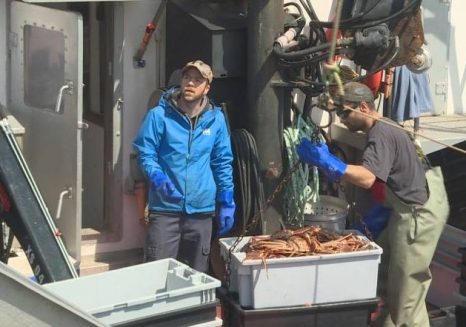
Crab fishermen struggle as season begins under strict new regulations making some fishing grounds off limits
Snow crab fishing began last week in northern New Brunswick, the first season under strict new regulations by Ottawa to protect the endangered North Atlantic right whale. The most drastic of the new measures has been the closing of a zone off the province’s northeastern coast to fishing, a location where 90 per cent of the whales had migrated to last summer. That area is also an area rich in snow crab. As many boats came back from their first trip out to sea, some fishermen couldn’t help but feel anxious about what the season would bring. >click to read<16:11
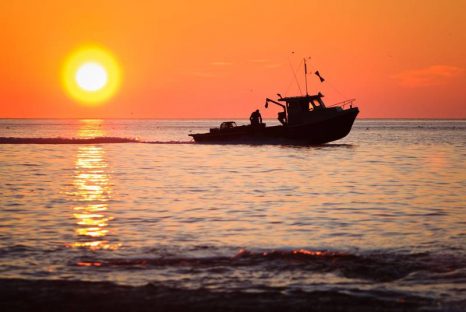
Endangered species
The federal government’s decision to extend rules protecting right whales to P.E.I.’s lobster fishermen sent waves of anxiety through the industry this week. The fishermen were reacting not only to the poor timing of the decision – coming just days before the lobster season’s opening on May 1 – but, more urgently, the prospect that their livelihood may dwindle if a right whale is spotted near a fishing vessel.,,, If our fishermen can’t prosper with their catch, it means fewer jobs at the Island’s processing facilities that employ hundreds. The effects trickle down from there, from the suppliers to lobster pounds to grocery stores, the tourism industry and eventually to all of us as consumers. >click to read<19:56
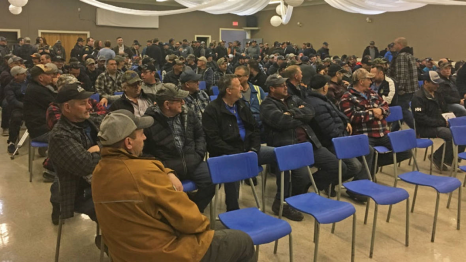
Fishermen’s union requests emergency meeting with minister over new lobster rules
The Maritime Fishermen’s Union has requested an emergency meeting with Fisheries and Oceans Minister Dominic LeBlanc before the lobster season starts next week to discuss new measures aimed at protecting North Atlantic right whales in the Gulf of St. Lawrence. The union doesn’t understand why the strict protective measures, which include closures and rope limits, have been sprung on lobster fishermen, said president Carl Allen.,,, LeBlanc walked past reporters Wednesday when asked about the issue.>click to read<17:44
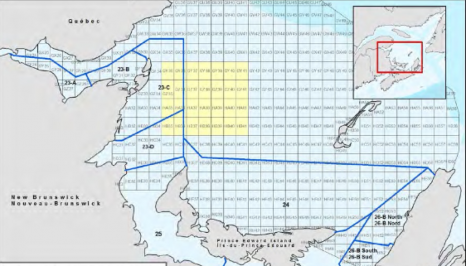
New rules sprung on lobster fishermen to protect whales
Parts of the water off the coast of New Brunswick will be closed to lobster fishing this season to protect the North Atlantic right whale, the Department of Fisheries and Oceans has told lobster fishermen.,, But Tuesday’s notice reveals many of the same measures announced in late March for the crab fishery will be applied to lobster fishing in the gulf as well. Lobster fishermen reacted with surprise and disappointment and suggested the new rules were mostly about the federal department’s public image. >click to read<17:48
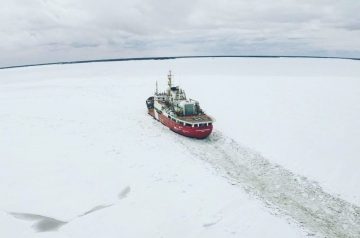
Snow crab season still on ice, Fishermen remain hopeful of early opening
Despite widespread interest in an early opening date, the president of the P.E.I. Snow Crab Association says weather and ice could dictate when snow crab fishermen in the Gulf of St. Lawrence get on the water. Carter Hutt said there was a desire to have the fishery open by April 20, but he noted there is still a considerable amount of ice in the gulf and the weather hasn’t been co-operating in terms of moving it out. >click to read<11:43
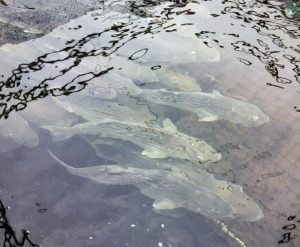
Striped bass population triples in Gulf of St. Lawrence
The remarkable recovery of striped bass in the southern Gulf of St. Lawrence reached unprecedented levels in 2017, according to the latest assessment from the federal Department of Fisheries and Oceans. Department scientists say the spawning population tripled between 2016 and 2017 and is now estimated at one million fish — a 100-fold increase from the 1990s. In addition to the population rebound, tagged striped bass from the Gulf were recovered from Rimouski, Que., north to Labrador for the first time in 2017. In the Forteau Bay area of Labrador, catches of tens of thousands were reported. >click to read<18:50

Ice, winds block early fishing season in Gulf of St. Lawrence
Thick ice and cold weather conditions are preventing an early snow crab fishing season that would help reduce potential ship strikes and whale entanglements in the Gulf of St. Lawrence. The Coast Guard’s Sir William Alexander, a light icebreaker, was called to smash through packs of ice off the northeast coast of New Brunswick to help the critically endangered North Atlantic right whales that are expected to make their way to Canadian waters later this spring. “The ice conditions are severe,” said Douglas Roe, commander of the icebreaker. >click to read<16:43
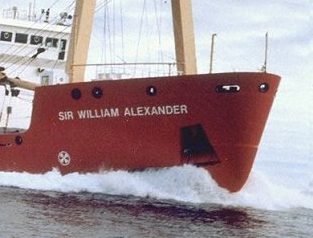
Icebreaker dispatched to Gulf of St. Lawrence to hasten crab season — and save whales
A Canadian Coast Guard icebreaker has been called in to smash through pack ice off the northeast coast of New Brunswick in an unusual bid to help the critically endangered North Atlantic right whales expected to make their way to Canadian waters later this spring. The goal is to allow local snow crab fishermen to complete their season in the Gulf of St. Lawrence earlier than usual, which should reduce the number of ship strikes and entanglements with fishing gear that killed so many whales last year. >click to read<08:14

P.E.I. Lobster fishery reduces floating rope in hopes of protecting North Atlantic right whales
Lobster fishers on P.E.I. are taking new measures this season to help protect the endangered North Atlantic right whales from entanglement. In January, Fisheries and Oceans Minister Dominic LeBlanc announced changes to the snow crab fishery in the Gulf of St. Lawrence to protect the right whales, including reducing the amount of rope floating on the surface and mandatory reporting of all lost gear. Fishermen are also required to report any sightings of the endangered whales. >click to read<13:46
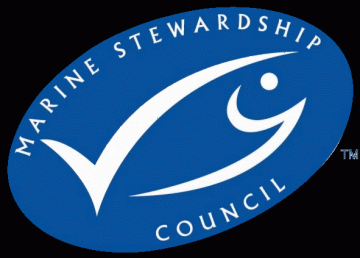
Gulf of St. Lawrence snow crab fishery’s sustainability designation suspended in wake of whale deaths
Canada’s lucrative Gulf of St. Lawrence snow crab fishery has had its certification as an environmentally sustainable fishery suspended. The London-based Marine Stewardship Council (MSC) announced Tuesday it was suspending the certification — a stamp of approval for consumers — because the fishery has been linked to North Atlantic right whale deaths. Twelve of the critically endangered whales died in the Gulf St. Lawrence last year, with necropsies performed on six. >click to read< 12:11

Low numbers of endangered whales raise question about lobster industry impacts
Woods Hole Oceanographic Institution scientist Mark Baumgartner said that to help the whales survive much longer, the ropes Maine lobstermen use to tend their traps have to be modified or even eliminated. And it’s not just for the whales’ sake. “I feel the industry is in jeopardy,” Baumgartner said.,,, Last month the Conservation Law Foundation’s Portland office filed a federal lawsuit against the National Oceanic and Atmospheric Administration for violating the Endangered Species Act. >click to read< 12:10
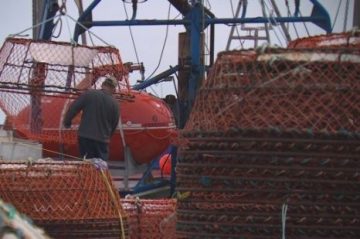
The Room Erupted! Tensions flare at suggestion snow crab fishery close for whales
Fishermen erupted in anger Wednesday when federal officials proposed banning snow crab fishing in a large zone off the coast of New Brunswick for the entire time endangered whales are there.
The proposal came at a meeting that industry and government officials hold every year to discuss the coming snow crab season in the southern Gulf of St. Lawrence. This year’s season is of particular importance after a deadly 2017 for the endangered North Atlantic right whale. Gear used in snow crab fishing is believed to have played a role in some of the whale deaths, with necropsies on three whales revealing signs of entanglement in fishing rope. >click to read< 00:27
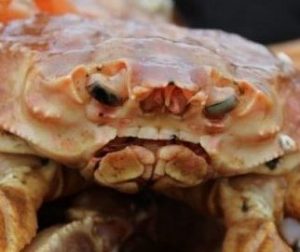
Gulf of St. Lawrence snow crab season to be discussed at Moncton meeting
Fisheries and Oceans Canada officials will meet with snow crab industry representatives in Moncton Wednesday to discuss the upcoming season in the southern Gulf of St. Lawrence. The purpose of the meeting is to “provide advice regarding global management issues in the snow crab fishery,” according to the agenda. Some of the topics to be discussed during the public meeting include the season opening and new management measures, proposed changes to the Fisheries Act and an update on enforcement of conservation and protection. >click to read< 08:14

Canada to introduce mandatory reporting of whale interactions this year
“Save the Whales” will take on new importance for Canadian fishermen in 2018 as the Department of Fisheries and Oceans introduces mandatory reporting for interactions Canada’s commercial fishing fleets have with marine mammals. The deaths of a dozen critically endangered right whales in the Gulf of St. Lawrence last year is the driving force behind the effort, which has already resulted in changes in the Gulf of St. Lawrence snow crab fishery, whose gear has been implicated in some of the deaths. >click to read<08:18

Fines for violating whale-protecting speed may be inadequate, says fisheries minister
Fisheries and Oceans Minister Dominic LeBlanc says he was “surprised” by the more than 500 reported speed limit violations in the Gulf of St. Lawrence last year and questions whether penalties should be stiffer to better protect North Atlantic right whales this year. “This is my own view, that a $6,000 fine may not represent an adequate sanction, it may not represent a sufficient deterrent,” said LeBlanc. ,,, As of late last week, only 14 of the 542 cases had resulted in a fine — all of them a minimum of $6,000, Transport Canada officials have said. >click here to read< 11:10
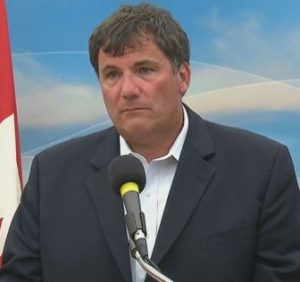
“We’re expecting 100 per cent compliance,” New snow crab fishing rules rein in use of ropes to protect North Atlantic right whales
Fisheries and Oceans Minister Dominic LeBlanc has announced four changes to the snow crab fishery in the southern Gulf of St. Lawrence to protect North Atlantic right whales from entanglement, including reducing the amount of rope floating on the surface and mandatory reporting of all lost gear. The new management measures will take effect immediately and will be enforced “very aggressively,” LeBlanc said during the news conference in Moncton on Tuesday. >click here to read<16:29
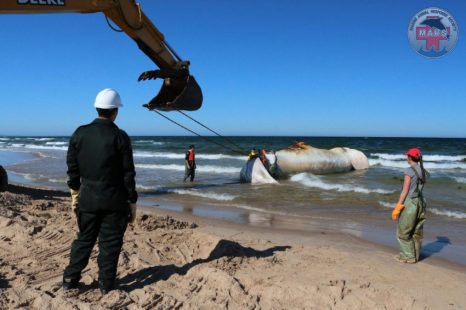
Here’s why 12 right whales died in Canadian waters — and why more will die if nothing is done
A macabre joke in the field is that there are more North Atlantic right whale researchers than actual North Atlantic right whales. The scientific community is tight-knit: on top of the hours many of them spend sardined together on research boats and survey planes, a consortium dedicated to studying and conserving the species gathers every year for a meeting that tips further towards family reunion than your average academic conference. Still, as biologists, conservationists and policy-makers began filling an auditorium at St. Mary’s University very early on a Sunday morning in late October, the emotional register of the meeting felt unusually charged. Attendees greeted each other with bracing hugs. click here to read the story 12:27
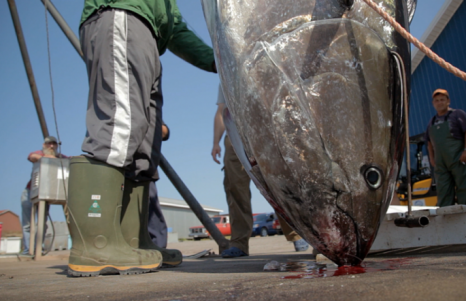
Bluefin tuna in P.E.I. are so hungry they no longer fear humans
Bobbing up and down on cold Atlantic waters, several fishermen toss scaly, silver mackerel overboard. It’s a delicious snack for a bluefin tuna — the largest species of tuna in the world, measuring more than six feet in length and weighing up to 1,600 pounds. The newcomer among them, a writer and ecologist, expects to spend the afternoon patiently waiting for a bite. Instead, the bluefin tuna here in North Lake, P.E.I. are so abundant and so hungry that within minutes their trademark yellow caudal finlets are circling the boat. click here to read the story 18:29
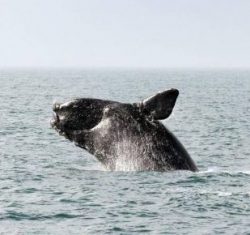
Pro-Active – P.E.I. snow crab industry figuring out how to protect endangered whales
Fisheries experts are on a tight timeline to figure out changes to the snow crab fishery to protect endangered right whales in the Gulf of St. Lawrence before the 2018 seasons starts. The season opens in April — including 35 Island fishermen landing about $14 million dollars worth for the Island. Fisheries and Oceans Canada (DFO) wants feedback from fishing groups in the next two to three weeks. Industry and DFO officials met in Moncton Wednesday to discuss possible solutions. One of the ideas was starting fishing earlier so fishermen could possibly reach their quota before whales arrive. click here to read the story 19:17
Transatlantic tuna may be boosting stocks in Gulf of St. Lawrence
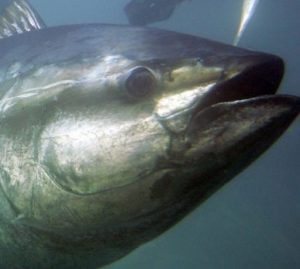 New science released by the international body that manages Atlantic bluefin tuna suggests a theory about why there have been so many tuna in the Gulf of St. Lawrence in recent years. Katie Schleit, senior marine campaign coordinator for the Ecology Action Centre, said science released by the International Commission for the Conservation of Tuna (ICCAT) found a large number of the tuna caught in Gulf waters are from the Mediterranean region. click here to read the story 16:33
New science released by the international body that manages Atlantic bluefin tuna suggests a theory about why there have been so many tuna in the Gulf of St. Lawrence in recent years. Katie Schleit, senior marine campaign coordinator for the Ecology Action Centre, said science released by the International Commission for the Conservation of Tuna (ICCAT) found a large number of the tuna caught in Gulf waters are from the Mediterranean region. click here to read the story 16:33
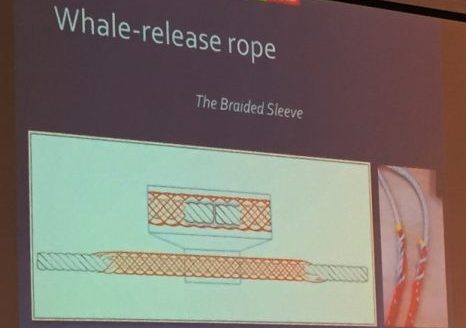
Changes can be made right now to save right whales, says fisherman
Fishermen in Nova Scotia’s snow crab industry say they are already making some immediate changes to prevent more deaths of North Atlantic right whales. Gordon MacDonald, managing director of the Snow Crab Fishermen’s Association off of southeastern Cape Breton, said he and other fishermen are already looking at ways to reduce the amount of slack rope attached to traps during the April-to-August snow crab season. “It’s easy, it’s quick and we can get on it right away and see how that goes and then get into other things.” He said the industry doesn’t need to wait for more study and changes to government regulations. “We can’t wait for that development to start doing things that have a positive impact,” he said. click here to read the story 09:53
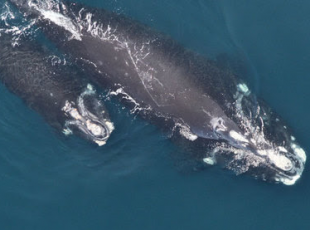
Right whale deaths spur regulators to eye fishing gear modifications
This has been a tough year for North Atlantic right whales. Late in October, according to the International Fund for Animal Welfare, the badly decomposed carcass of a right whale was found ashore on Nashawena Island, south of Cape Cod in Massachusetts. It was the 16th of the highly endangered species known to have died in U.S. or Canadian waters in 2017. Starting in the early spring and continuing through the late summer months, a dozen dead right whales were found floating in Canada’s Gulf of St. Lawrence.,,, Last year, the NOAA Fisheries Large Whale Take Reduction Team (TRT) began a five-year review click here to read the story 08:23
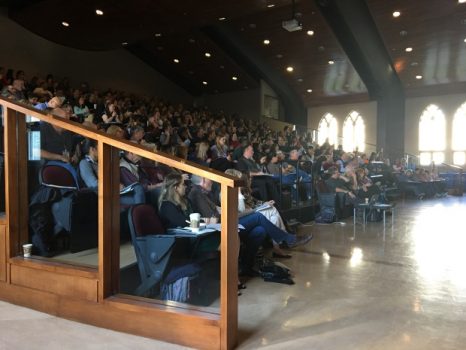
North Atlantic Right Whale Consortium – scientists say Right whales could be 20 years away from certain extinction
Scientists at an annual meeting for North Atlantic right whales estimate the species has a little over two decades left to survive unless changes are made immediately. The North Atlantic Right Whale Consortium’s annual meeting was held in Halifax on Sunday, and all of the scientists spoke with a sense of urgency about the fate of these whales. This summer, at least 15 right whales died in Canadian and U.S. waters and scientists at the conference stressed that human activity is the primary cause of death for all right whales. click here to read the story 11:21
Fishing industry group says it’s looking for ways to prevent Atlantic right whale entanglements
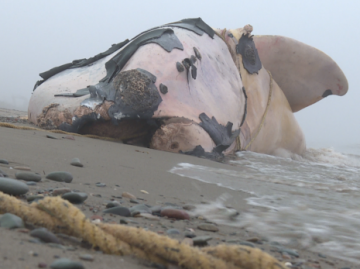 The fishing industry says it’s looking for a solution to help prevent North Atlantic right whales from enduring painful, and sometimes deadly, entanglements with fishing gear. The Maritime Fishermen’s Union says a longer snow crab fishing season and an unprecedented number of right whales in the Gulf of St. Lawrence created a “perfect storm” this year for a massive die-off.,,, “Our association is being proactive with this issue and there are some consultations that will be going forward with the Department of Fisheries and Oceans as soon as early November,” click here to read the story 15:24
The fishing industry says it’s looking for a solution to help prevent North Atlantic right whales from enduring painful, and sometimes deadly, entanglements with fishing gear. The Maritime Fishermen’s Union says a longer snow crab fishing season and an unprecedented number of right whales in the Gulf of St. Lawrence created a “perfect storm” this year for a massive die-off.,,, “Our association is being proactive with this issue and there are some consultations that will be going forward with the Department of Fisheries and Oceans as soon as early November,” click here to read the story 15:24
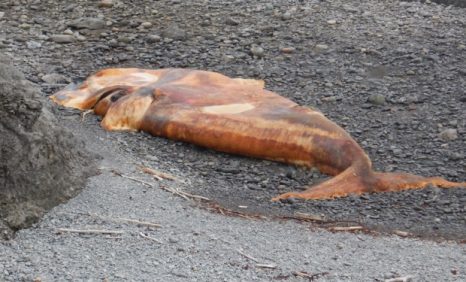
Veterinarians release results from study of North Atlantic right whale deaths
Veterinarians examining the carcasses of six right whales found dead in the Gulf of St. Lawrence this summer say four died from blunt force trauma, one was entangled in fishing gear and the other was too decomposed to say for sure. Pierre-Yves Daoust of the Atlantic Veterinary College says there was no evidence to suggest various toxins may have played a major role in the deaths.,,, About a dozen North Atlantic right whales have died in the Gulf since June — an unprecedented number of deaths for a marine mammal that is at risk of extinction with an estimated population of just 458. click here to read the story 12:23
Statement by Ministers LeBlanc and Garneau on report released on this summer’s North Atlantic Right Whale deaths – click here to read the statement
Enviro Groups Demand U.S., Canada Act to Save North Atlantic Right Whales
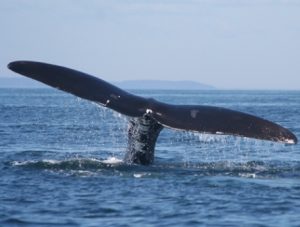 Conservation and animal-protection groups today sought action by the United States and Canada to prevent painful, deadly entanglements in fishing gear that threaten the critically endangered North Atlantic right whale. In letters to Canadian officials and the U.S. National Marine Fisheries Service, the groups demanded action to reduce risks to these imperiled whales. North Atlantic right whales, one of the world’s most endangered mammals with fewer than 500 individual animals remaining on Earth, lost nearly 3 percent of their population this year. click here to read the story 14:00
Conservation and animal-protection groups today sought action by the United States and Canada to prevent painful, deadly entanglements in fishing gear that threaten the critically endangered North Atlantic right whale. In letters to Canadian officials and the U.S. National Marine Fisheries Service, the groups demanded action to reduce risks to these imperiled whales. North Atlantic right whales, one of the world’s most endangered mammals with fewer than 500 individual animals remaining on Earth, lost nearly 3 percent of their population this year. click here to read the story 14:00


































